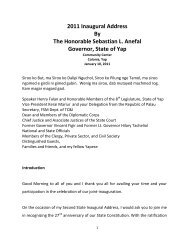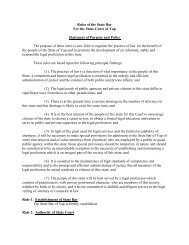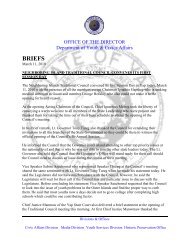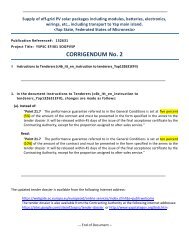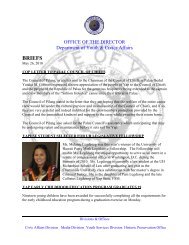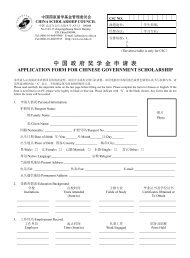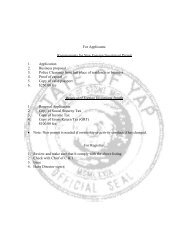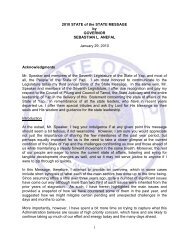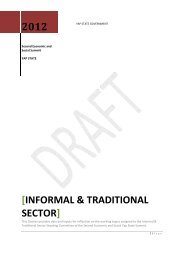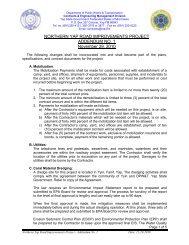RULES OF CIVIL PROCEDURE For the Trial Division of the Yap ...
RULES OF CIVIL PROCEDURE For the Trial Division of the Yap ...
RULES OF CIVIL PROCEDURE For the Trial Division of the Yap ...
You also want an ePaper? Increase the reach of your titles
YUMPU automatically turns print PDFs into web optimized ePapers that Google loves.
(b) Incompetency. If a party becomes incompetent, <strong>the</strong> court upon motion served as<br />
provided in subdivision (a) <strong>of</strong> this rule may allow <strong>the</strong> action to be continued by or against<br />
his representative.<br />
(c) Transfer <strong>of</strong> Interest. In case <strong>of</strong> any transfer <strong>of</strong> interest, <strong>the</strong> action may be<br />
continued by or against <strong>the</strong> original party, unless <strong>the</strong> court upon motion directs <strong>the</strong> person<br />
to whom <strong>the</strong> interest is transferred to be substituted in <strong>the</strong> action or joined with <strong>the</strong><br />
original party. Service <strong>of</strong> <strong>the</strong> motion shall be made as provided in subdivision (a) <strong>of</strong> this<br />
rule.<br />
(d) Public Officers; Death or Separation from Office.<br />
(1) When a public <strong>of</strong>ficer is a party to an action in his <strong>of</strong>ficial capacity and during<br />
its pendency dies, resigns, or o<strong>the</strong>rwise ceases to hold <strong>of</strong>fice, <strong>the</strong> action does not abate<br />
and his successor is automatically substituted as a party. Proceedings following <strong>the</strong><br />
substitution shall be in <strong>the</strong> name <strong>of</strong> <strong>the</strong> substituted party, but any misnomer not affecting<br />
<strong>the</strong> substantial rights <strong>of</strong> <strong>the</strong> parties shall be disregarded. An order <strong>of</strong> substitution may be<br />
entered at any time, but <strong>the</strong> omission to enter such an order shall not affect <strong>the</strong><br />
substitution.<br />
(2) When a public <strong>of</strong>ficer sues or is sued in his <strong>of</strong>ficial capacity, he may be<br />
described as a party by his <strong>of</strong>ficial title ra<strong>the</strong>r than by name; but <strong>the</strong> court may require his<br />
name to be added.<br />
V. DEPOSITIONS AND DISCOVERY<br />
Rule 26. General Provisions Governing Discovery.<br />
(a) Discovery Methods. Parties may obtain discovery by one or more <strong>of</strong> <strong>the</strong><br />
following methods: depositions upon oral examination or written questions; written<br />
interrogatories; production <strong>of</strong> documents or things or permission to enter upon land or<br />
o<strong>the</strong>r property, for inspection and o<strong>the</strong>r purposes; physical and mental examinations; and<br />
requests for admission. Unless <strong>the</strong> court orders o<strong>the</strong>rwise under subdivision (c) <strong>of</strong> this<br />
rule, <strong>the</strong> frequency <strong>of</strong> use <strong>of</strong> <strong>the</strong>se methods is not limited.<br />
(b) Scope <strong>of</strong> Discovery. Unless o<strong>the</strong>rwise limited by order <strong>of</strong> <strong>the</strong> court in accordance<br />
with <strong>the</strong>se rules, <strong>the</strong> scope <strong>of</strong> discovery is as follows:<br />
(1) In General. Parties may obtain discovery regarding any matter, not privileged,<br />
which is relevant to <strong>the</strong> subject matter involved in <strong>the</strong> pending action, whe<strong>the</strong>r it relates<br />
to <strong>the</strong> claim or defense <strong>of</strong> <strong>the</strong> party seeking discovery or to <strong>the</strong> claim, or defense <strong>of</strong> any<br />
o<strong>the</strong>r party, including <strong>the</strong> existence, description, nature, custody, condition and location<br />
<strong>of</strong> any books, documents, or o<strong>the</strong>r tangible things and <strong>the</strong> identity and location <strong>of</strong> <strong>the</strong><br />
persons having knowledge <strong>of</strong> any discoverable matter. It is not ground for objection that<br />
<strong>the</strong> information sought will be inadmissible at <strong>the</strong> trial if <strong>the</strong> information sought appears<br />
reasonably calculated to lead to <strong>the</strong> discovery <strong>of</strong> admissible evidence.



